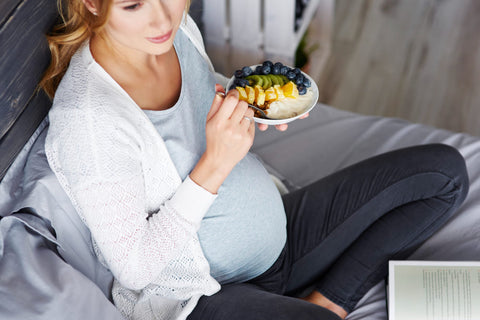Good breastfeeding support (for a nutritious milk supply) and a healthy pregnancy diet consists of high-quality protein foods, healthy fats and complex carbohydrates to ensure the health of you and your baby (7).
1. Fresh vegetables
Vegetables are nutrient-dense, high in fibre and low in carbs and calories (1). They have been linked to a reduced risk of low birth weight.
Green Leafy vegetables have high fibre, Vitamin C, K, A, Calcium, Iron, Folate, and Potassium content which are very important when pregnant (4).
For example, broccoli contains fibre, Vitamin C, Manganese and Magnesium (1). Asparagus contains fibre, protein, Vitamins K, C, A, B6, B2, B1 and Folic Acid (6).
Avocados are high in fibre, B Vitamins, Vitamin K, Potassium, Copper, Vitamin E, and Vitamin C. Due to their folic acid content, they may help prevent neural tube defects and developmental abnormalities of the brain and spine such as a baby with spina bifida or tube defects.
Sweet potatoes are rich in Beta Carotene and fibre, which is essential for the baby's development. Fibre can help prevent pregnancy constipation and reduce blood sugar spikes (gestational diabetes) (4).
2. Fresh Fruit
Fruits are high in Vitamin K, C, A, E and fibre (1).
Berries such as blueberries, raspberries, goji berries, strawberries, and acai berries are highly recommended as they have a low glycaemic index, meaning they won't cause spikes in blood sugar. They provide carbs, vitamin C, fibre, and antioxidants.
Dried fruit is higher in calories but contains the same amount of nutrients as fresh fruit. For example, prunes are rich in fibre, potassium, and Vitamin K. They’re natural laxatives and can be helpful in relieving pregnancy constipation.
Dates are high in fibre, potassium, iron, and plant compounds (4).
Fruits high in Vitamin C (oranges, lemons, grapefruit) also provide Vitamins A, C, B1, B2, B3, B5, B6, Calcium, Folic Acid, Phosphorus, Magnesium, Copper and Manganese. Vitamin C contributes to collagen formation (for the normal function of blood vessels, bones, cartilage and skin), the normal function of the immune and nervous system and increases iron absorption (6).
3. Eggs
Egg yolk provides Choline which is important for foetal development. They also provide healthy fats, Vitamin E, B12, D (5), Calcium, Omega-3 (6), Beta-Carotene and Iodine. Iodine plays a role in the growth and brain development in infants (1).
4. Salmon
Salmon has a high DHA and EPA content which contributes to normal growth, brain and eye development of the foetus and breastfed infants. Salmon also has a high Vitamin D, Iodine, Choline, B Vitamins, Selenium and protein content (1, 6).
Fish liver oil is also an excellent source of Omega-3 and Vitamin A (4).
5. Meat
Protein (amino acids) are essential for your baby’s growth. Good sources are chicken breast, organic turkey and grass-fed beef (1).
Beef is rich in Iron, Choline and B Vitamins. Iron contributes to normal cognitive function, the formation of red blood cells and haemoglobin, normal oxygen transport and has a role in the process of cell division which is important in your third trimester.
Low levels of iron can cause deficiency anaemia, which increase the risk of low birth weight (4).
Chicken and duck have high levels of Calcium, Phosphorus, Iron, Vitamins A, B1, B2, D and E (6).

6. Nuts and Seeds
Nuts, for example, almonds contain healthy fats, protein, fibre, Calcium, Magnesium and Iron.
Walnuts contain Omega-3, Folic Acid and Copper. Brazil nuts contain Selenium, Phosphorous and Vitamin E.
Seeds also provide protein and fibre. Flax seeds and Chia seeds are good vegetarian sources of Omega-3 (1,6). Chia seeds can replenish lost nutrients, help prevent iron deficiency, balance blood sugar levels, boost energy levels and help prevent constipation (3).
7. Dairy Products
Extra protein and Calcium are needed to meet the demands of a growing baby. Dairy products provide casein, whey, Calcium, Phosphorous, B Vitamins, Magnesium and Zinc. Some dairy products such as Greek yoghurt and Kefir (1) even contain probiotics which are beneficial for the digestive system and encourage regular bowel movements (4).
Calcium is important for bone, teeth and muscle growth, minimising the risk of osteoporosis (6).
8. Beans, Lentils and Legumes
Beans are filling, nutrient-dense and contain protein, fat, vitamins and minerals. Examples include chickpeas, kidney, fava, lima and pinto beans, which are high in Folic Acid, Iodine, Iron, Zinc, Copper and Vitamin K (1,2). Vitamin K plays a role in development of the central nervous system (6).
Lentils provide Folic Acid which reduces the risk of the baby developing cardiovascular and urinary tract defects, neural tube defects and cleft lips (1).
Legumes (peas, chickpeas and more) provide fibre, Iron, Folic Acid, Calcium, Magnesium and Potassium (4).
9. Whole Grains
Whole grains such as oats, rice, quinoa and barley provide complex carbohydrates, protein, fibre and plant compounds. Grains also contain B Vitamins, Zinc, Selenium, Magnesium and Chromium which are vital during all weeks of pregnancy (1).
Brown or wheat rice, pastas and breads are much healthier and more beneficial than white rice, pastas and breads (4).
10. Supplements
Supplements during pregnancy are vital to minimise any nutrient deficiencies and ensure the baby does not have any birth defects, such as iron supplements. The recommended daily intake of particular vitamins and minerals are higher during pregnancy. Deficiencies can be determined by a blood test.
Ginger supplements Magnesium supplements have been known to help control morning sickness.
Pregnazon and Pregnazon Complete provide optimum nutritional support from pre-conception, through all trimesters and even during breastfeeding (up to at least six months of age). Specifically formulated for a healthy pregnancy, containing 21 essential vitamins, minerals, trace elements, and antioxidants, fortified with Omega-3.
Related Articles
Sources
- Pregnancy Diet: What Are the Best Foods & Supplements? - Dr. Axe (draxe.com)
- Lima Beans Nutrition, Benefits, Recipes and Risks - Dr. Axe (draxe.com)
- Chia Seed During Pregnancy: 6 Benefits of This Superfood - Dr. Axe (draxe.com)
- Pregnancy Diet: 13 Foods to Eat While Pregnant | Healthline Parenthood
- Pregnancy Diet: What to Eat During Pregnancy | Pampers
- 10 best pregnancy foods in the first 3 months - HealthAndLife (thehealthandlife.com)
- Pregnancy Diet: What Are the Best Foods & Supplements? - Dr. Axe (draxe.com)
- Images: Image by gpointstudio on Freepik Image by jcomp on Freepik
Any information or product suggested on this website is not intended to diagnose, treat, cure, or prevent any medical condition. Never disregard medical advice or delay in seeking it because of something you have read on this website. Consult your primary healthcare physician before using any supplements or making any changes to your regime.





